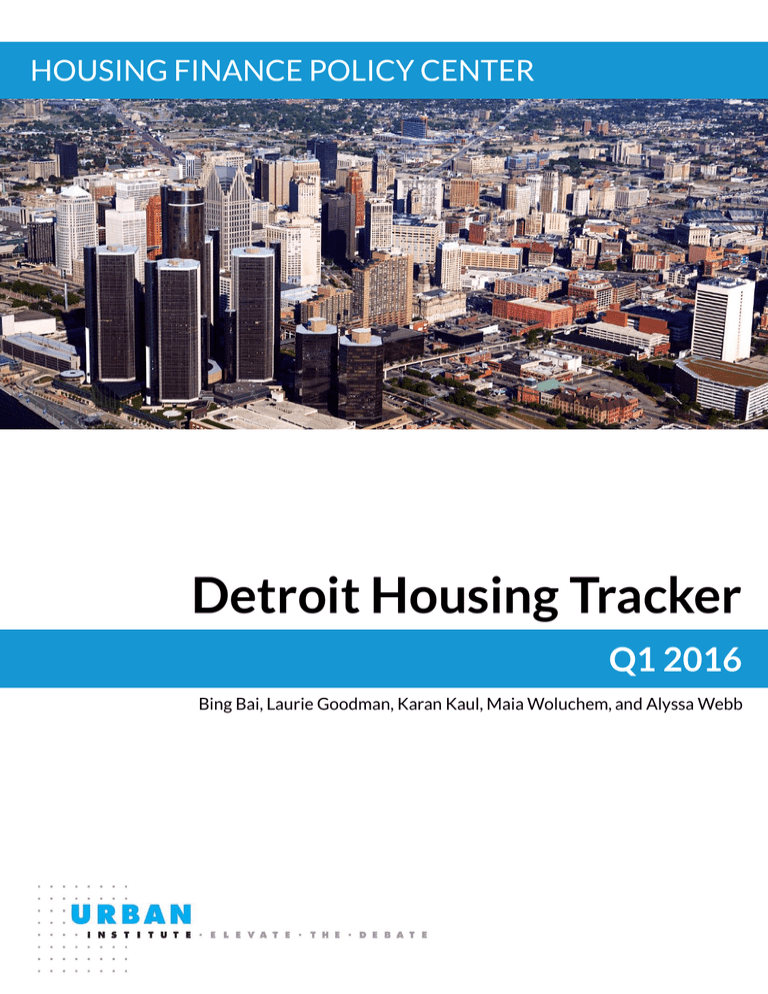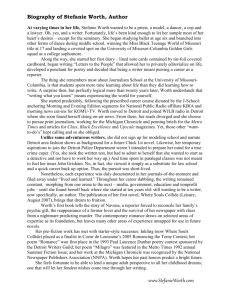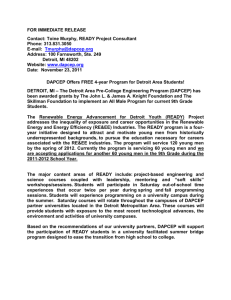
HOUSING FINANCE POLICY CENTER
Detroit Housing Tracker
Q1 2016
Bing Bai, Laurie Goodman, Karan Kaul, Maia Woluchem, and Alyssa Webb
1
Inside This Issue
•
•
•
•
•
•
•
Sale prices across the city continued to grow in 2015, led by the Woodward Corridor and East Riverfront
areas (page 5)
As both the number and share of loans underwater continued to decline, the average household equity for
all Detroit loans reached 29 percent in Q4 2015 (page 6)
The shares of loans in serious delinquency, foreclosure, or REO in Detroit are on pace to fall below pre-crisis
levels. There was a particularly sharp decline in the share of REOs (pages 7 and 8)
About 18,522 single-family homes were sold in Detroit in 2015, down 18 percent from a year ago (page 9)
Detroit’s median rent stabilized at around $756 a month in December 2015 (page 9)
This month we have added cash sales data. Detroit’s cash sales share is very high relative to the Wayne
County or to the US. However, Detroit’s share has historically been high relative to other areas (page 10).
Unemployment fell again in early months of 2016, after a slight uptick in the previous quarter, and labor
force size edged up as well (page 11)
About the Detroit Housing Tracker
The Detroit housing market faces numerous challenges as the city charts a path toward less blight, increased
housing preservation, and a better functioning residential mortgage market. Drawing from a wide range of data
and sources, the Detroit Housing Tracker monitors the latest development in the Detroit housing and
community development arena. Updated quarterly, this publication has two sections. Detroit Housing Market
Trends presents comprehensive market indicators including sales prices and volumes, rental prices, household
equity level, delinquencies and foreclosures, and general labor market conditions. Detroit News tracks housing
and business news and key mortgage programs.
We welcome feedback on how to make the Detroit Housing Tracker more useful. Please e-mail any
comments or questions to ataglance@urban.org.
Contents
Detroit Housing Market Trends
Zip Code–Defined Districts
4
Sales Prices Continued to Increase
5
Household Equity Continued to Increase: Underwater Loans Continued to Decrease
6
Seriously Delinquent Loans Down to Pre-Crisis Levels
7
Foreclosures and REOs Nearly Down to Pre-Crisis Levels; REOs Down Sharply
8
Home Sales down in 2015; Rents Stable
9
Cash Sales Remained High
10
Unemployment Fell after Previous Quarter’s Uptick ; Size of Labor Force Edged up
11
Detroit News
Key Detroit-Focused Lending Programs
12
Detroit Housing Market News
14
Detroit Business News
17
Other Related Links
19
3
Zip Code–Defined Districts
Northeast Detroit
Detroit Westside
Southwest
Detroit
Sources: Federal ReserveDebt,
Bank of Chicago and Mapsof.net.
household
mortgages,
$9,833
4
MARKET TRENDS
Sales Prices Continued to Increase
Mean and Median Sale Prices, Detroit and Wayne County
Detroit mean
Detroit median
Wayne County mean
Wayne County median
Thousands of dollars
140
120
100
80
60
40
20
0
2005
2006
2007
2008
2009
2010
2011
2012
2013
2014
2015
Source: Urban Institute calculations from CoreLogic data.
Note: All series are based on three-month moving averages.
Mean Sale Prices by District, Detroit
Detroit Westside
East Riverfront
Northeast Detroit
Southwest Detroit
Woodward Corridor
All districts
Thousands of dollars
120
100
80
60
40
20
0
2005
2006
2007
2008
2009
2010
2011
2012
2013
2014
2015
Source: Urban Institute calculations from CoreLogic data.
Note: All series are based on three-month moving averages.
5
MARKET TRENDS
Household Equity Continued to Increase;
Underwater Loans Continued to Decrease
Household Equity and Share of Loans
Underwater, Detroit and Wayne County
Number of Loans Underwater, Detroit and
Wayne County
Detroit
Detroit: share underwater
Thousands
Detroit: average household equity
160
Wayne County: share underwater
Wayne County: average household equity
140
60%
120
50%
100
40%
80
30%
20%
60
10%
40
0%
20
-10%
2009
Wayne County
2010
2011
2012
2013
2014
0
2009
2015
Source: Urban Institute calculations from CoreLogic data.
2010
2011
2012
2013
2014
2015
Source: Urban Institute calculations from CoreLogic data.
Share of Loans Underwater by District, Detroit
Detroit Westside
East Riverfront
Northeast Detroit
Southwest Detroit
Woodward Corridor
All districts
60%
50%
Debt,
household
mortgages,
$9,833
40%
30%
20%
10%
0%
2009
2010
2011
2012
2013
2014
2015
Source: Urban Institute calculations from CoreLogic data.
6
MARKET TRENDS
Serious Delinquency Loans Down
to Pre-Crisis Levels
Serious Delinquency Rates, Detroit and Wayne County
Detroit
Wayne County
35%
30%
25%
20%
15%
10%
5%
0%
2005
2006
2007
2008
2009
2010
2011
2012
2013
2014
2015
2014
2015
Sources: Urban Institute calculations from CoreLogic data.
Note: Includes loans delinquent by 90 days or more and loans in foreclosure or REO.
Serious Delinquency Rates by District, Detroit
Detroit Westside
Northeast Detroit
Woodward Corridor
East Riverfront
Southwest Detroit
All districts
35%
30%
Debt,
household
mortgages,
$9,833
25%
20%
15%
10%
5%
0%
2005
2006
2007
2008
2009
2010
2011
Source: Urban Institute calculations from CoreLogic data.
Note: Includes loans delinquent by 90 days or more and loans in foreclosure or REO.
2012
2013
7
MARKET TRENDS
Foreclosures and REOs Nearly Down
to Pre-Crisis Levels; REOs Down sharply
Foreclosure Rates, Detroit and Wayne County
Detroit
REO Rates, Detroit and Wayne County
Wayne County
Detroit
10%
Wayne County
14%
9%
12%
8%
10%
7%
6%
8%
5%
6%
4%
3%
4%
2%
2%
1%
2015
2014
2013
2012
2011
2010
2009
2008
2007
2006
2015
2013
2012
2011
2010
2009
2008
2007
2006
2005
2014
Sources: Urban Institute calculations from CoreLogic data.
Sources: Urban Institute calculations from CoreLogic data.
Foreclosure Rates by District, Detroit
Detroit Westside
Northeast Detroit
Woodward Corridor
2005
0%
0%
REO Rates by District, Detroit
Detroit Westside
Northeast Detroit
Woodward Corridor
East Riverfront
Southwest Detroit
All districts
East Riverfront
Southwest Detroit
All districts
16%
12%
14%
10%
Debt,
household
mortgages,
$9,833
8%
12%
10%
6%
8%
6%
4%
4%
2%
2%
Sources: Urban Institute calculations from CoreLogic data.
Sources: Urban Institute calculations from CoreLogic data.
2015
2014
2013
2012
2011
2010
2009
2008
2007
2006
0%
2005
2015
2014
2013
2012
2011
2010
2009
2008
2007
2006
2005
0%
8
MARKET TRENDS
Home Sales Down in 2015; Rents Stable
Number of Sales by Type, Detroit, 2005–15
New construction
Resale
REO
Short sale
Other
30,000
25,000
20,000
15,000
10,000
5,000
0
2005
2006
2007
2008
2009
2010
2011
2012
2013
2014
2015
Source: Urban Institute calculations from CoreLogic data.
Sales Year Over Year
New construction
Resale
REO
Short
sale
Other
Total
sales
2014
218
6461
12530
72
3375
22656
2015
183
5484
9541
62
3252
18522
-16.1%
-15.1%
-23.9%
-13.9%
-3.6%
-18.2%
%Change YOY
Sources: Urban Institute calculations from CoreLogic data.
Note: 2015 numbers are based on Q1–Q3 only.
Median Rent by District, Detroit
880
860
840
Detroit Westside
East Riverfront
Northeast Detroit
Southwest Detroit
Woodward Corridor
All districts
Debt,
household
mortgages,
$9,833
820
800
780
760
740
720
700
2011
2012
Source: Urban Institute calculations from Zillow data.
2013
2014
2015
9
MARKET TRENDS
Cash Sales Remained High
Cash Sales Share
Detroit City
Wayne County
US
100%
90%
80%
70%
60%
50%
40%
30%
20%
10%
0%
2003
2004
2005
2006
2007
2008
2009
2010
2011
2012
2013
2014
Sources: Urban Institute Calculations from CoreLogic and HMDA Data.
Note: Cash Sales Share= ((CoreLogic Cash Sales)/(CoreLogic Cash Sales + HMDA purchase mortgages)).
Cash Sales by Type, Detroit, 2003-2015
New construction
Resale
REO sale
Short sale
Other
100%
25,000
90%
80%
20,000
70%
60%
15,000
Debt,
household
mortgages,
$9,833
10,000
50%
40%
30%
20%
5,000
10%
2015
2014
2013
2012
2011
2010
2009
2008
2007
2006
2005
2004
2015
2014
2013
2012
2011
2010
2009
2008
2007
2006
2005
2004
2003
2003
0%
0
Sources: Urban Institute Calculations from CoreLogic Data..
10
MARKET TRENDS
Unemployment Fell after Previous Quarter’s
Uptick ; Size of Labor Force Edged Up
Unemployment Rate by County
Wayne
Macomb
Oakland
Percent
20
18
16
14
12
10
8
6.74
5.70
6
4.67
4
2
0
2004
2005
2006
2007
2008
2009
2010
2011
2012
2013
2014
2015
2016
Sources: US Bureau of Labor Statistics, Moody's Analytics, and Urban Institute.
Size of Labor Force by County
Wayne
Macomb
Oakland
Hundred thousands
10
9
8
7.61
7
Debt,
household
mortgages,
$9,833
6
5
6.38
4.24
4
3
2
1
0
2004
2005
2006
2007
2008
2009
2010
2011
2012
2013
2014
2015
2016
Sources: U.S. Bureau of Labor Statistics, Moody's Analytics, and Urban Institute.
11
Key Detroit-Focused Lending Programs
Program
Summary
Features
Detroit Home
Mortgage
Initiative
Allows borrowers to obtain a first
mortgage for the appraised value of
a home, as well as a second
mortgage of up to $75,000 to cover
the cost of renovations.
•
•
•
More Information
Applicants must have a FICO score
of 640 (600 in some cases), and have
adequate income and the required
down payment to program
underwriting guidelines
Property must be a primary
residence within the city of Detroit
Offered through local banks and
nonprofits, including the Kresge
Foundation, Community
Reinvestment Fund, Huntington
Bank, Flagstar Bank, Talmer
Bancorp, First Merit Michigan, and
Liberty Bank
Homeowners must own and occupy
their home for at least six months
before applying
Minimum 560 FICO; free credit
counseling to improve credit score
Insurance and taxes must be current
http://detroithomemortgage.org/
#faq
0% interest loans from $5,000 to
$25,000 to help homeowners repair
their homes; joint effort of the City
of Detroit, Detroit Local Initiatives
Support Corporation (LISC), and
Bank of America
•
Detroit
Neighborhood
Initiative
Combines a zero down payment,
low-interest fixed-rate mortgage,
and other favorable terms with
rehabilitation dollars needed to
rebuild Detroit’s classic houses and
neighborhoods
•
A cooperative effort of NACA, Bank
of America, and the Opportunity
Resource Fund; announced April
2015
http://www.buildingdetroit.org/de
troit-neighborhood-initiative/
Entrepreneurs of
Color Fund
$6.5 million lending program for
businesses owned by people of color
and that primarily hire people of
color; goal is to provide support for
Detroit small businesses that lack
access to traditional forms of credit
•
•
Established September 2015
Supported by the Detroit
Development Fund, the JPMorgan
Chase Foundation, and the W.K.
Kellogg Foundation
https://www.jpmorganchase.com/
corporate/news/stories/entrepre
neurs-of-color-fund.htm
FirstMerit Bank
Down Payment
Assistance
Program
Offers grants of up to $30,000 to
homebuyers for down payment,
closing costs, and rehabilitation
assistance in Wayne County
neighborhoods
•
Down payment assistance loan
forgiven after five years
Owner must occupy home as a
primary residence
Mandatory financial literacy course
http://auctions.buildingdetroit.org
/Content/files/financing/auctions_
financing_firstmerit_2015_09_28.p
ng
Flagstar Bank
City Employee
Loan Program
Announced in June 2015 and
available only for Detroit City
employees. Highlights include
• up to 300% loan-to-value ratio
allowed;
• renovation funding included;
• fifteen-year fixed-rate
mortgage; and
• loans held by Flagstar
•
•
•
•
620 minimum FICO
Max loan amount $417,000
Prepurchase counseling required
Taxes and insurance must be
escrowed
http://www.detroitmi.gov/News/
ArticleID/318/New-MortgageProgram-Aims-to-BoostEmployee-Residency-in-DetroitIncrease-Wave-of-HomeRenovation-Projects
Detroit 0% Home
Repair Loans
Program
•
•
•
•
http://www.detroithomeloans.org
/
12
Key Detroit-Focused Lending Programs
Program
Summary
Features
Liberty Bank
Detroit Home
Restoration
Program
Provides affordable loans to Detroit
residents who successfully bid in the
Neighbors Wanted auction.
•
•
•
Talmer Bank &
Trust
Conditional
Grant
Offers $25,000 in a forgivable grant
to assist auction winners of the
Detroit Land Bank Authority with
home repair costs for homes in
Marygrove neighborhood
•
Wells Fargo
HomeLIFT℠
down payment
assistance
program
Provides forgivable down payment
assistance for primary, owneroccupied residences within select
city limits in Wayne County
•
•
•
•
•
•
More Information
First six months interest-only
payments (rehabilitation phase)
Down payment assistance available
for those earning below 100% of
area median income (AMI)
Mandatory housing counseling
http://www.libertybank.net/comm
unity/detroit.cfm
Burns off at a rate of 20 percent a
year
Owner must occupy home as a
primary residence
Funds cannot be used for home
purchase
http://auctions.buildingdetroit.org
/Financing
$15,000 assistance forgivable 20%
each year for five years
Administered through
NeighborWorks® America and its
affiliates
Household income cannot exceed
120% of AMI
Counseling required
http://www.swsol.org/lift/
13
Detroit Housing Market News
“Detroit land bank funds at limit as inventory grows” (The Detroit News, April 11, 2016)
http://www.detroitnews.com/story/news/local/detroit-city/2016/04/11/detroit-land-bank-funds-limitinventory-grows/82880806/
Historically, ownership of the neglected homes has been mixed, involving the city, Wayne County and private
parties. But in recent years, a growing number has been directed to the Detroit Land Bank, which has become
a central repository for most city property, much of it inherited from the county foreclosure tax sale when
properties don’t sell.
City Councilwoman Mary Sheffield is concerned about the land bank’s ability to maintain, secure and
adequately keep up homes. In a closing resolution tied to the council’s 2016-17 fiscal year budget, Sheffield
crafted language stressing the need for additional dollars to expand maintenance for all land bank properties,
including dumping, snow and debris removal.
“Detroit, Flint get more money for blight fight” (The Detroit News, April 4, 2016)
http://www.detroitnews.com/story/news/local/michigan/2016/04/04/blight-funding-detroitflint/82613136/
Detroit will receive $41.9 million in federal funding to fight blight and Flint $13.9 million under a $74.5 million
state plan approved by the U.S. Department of Treasury.
Gov. Rick Snyder announced approval and said the state will use 75 percent of its total federal award from
the Hardest Hit Fund to boost blight elimination efforts in Detroit and Flint. The other 25 percent — $18.6
million — will be used to support mortgage assistance programs.
“Lawsuits claim Wayne Co. keeps botching foreclosures” (The Detroit News, April 4, 2016)
http://www.detroitnews.com/story/news/local/wayne-county/2016/04/04/lawsuits-claim-wayne-cokeeps-botching-foreclosures/82597812/
Wayne County is spending up to $18.6 million warning property owners they face tax foreclosure, but
lawsuits allege the office is doing such a poor job that some owners aren’t aware they’ve lost homes until it’s
too late.
18 families have sued Wayne County and several suburbs in federal court, alleging the foreclosures are illegal
because the owners didn’t receive notices and believed they had more time to pay taxes and save their
properties. All face possible eviction.
“Bringing down the house: Pontiac chips away at city's blight” (Crain’s Detroit Business, April 1, 2016)
http://www.crainsdetroit.com/article/20160401/BLOG016/160409990/bringing-down-the-house-pontiacchips-away-at-citys-blight
Bill Pulte, the founder and chairman of the Detroit Blight Authority, said the 900 or so blighted homes in
Pontiac identified in 2014 could be demolished by the end of 2017 – or the end of 2018, at the latest. "There
has been over 450 demolitions in Pontiac so far," said Pulte.
It released the findings of its survey in a 350-page report in May 2014, with an estimated price tag of $850
million for the demolition.
14
Detroit Housing Market News
“Looking to buy a house? Gear up for bidding war” (Detroit Free Press, March 30, 2016)
http://www.freep.com/story/money/business/michigan/2016/03/29/metro-detroit-homeprices/82375546/
Metro Detroit home prices will be about 7% higher this spring than last year as selling season gets under way,
essentially back to late 2007 levels, according to the latest Standard & Poor's/Case-Shiller Home Price index
released March 29th, 2016.
“Banks Finding Opportunities to Lend Again in Detroit” (ABC News, March 27, 2016)
http://abcnews.go.com/US/wireStory/banks-finding-opportunities-lend-detroit-37963500
Financial institutions seeking reward after risk are extending loan and grant programs into some of the city's
less fashionable neighborhoods, where the process of renovating salvageable houses and filling them with
families is a necessary step if Detroit is to continue slowing a decades-long population dive.
Obstacles toward that goal include the poor condition of the housing stock, appraisals far below the asking
price, shaky personal credit in one of the country's poorest economies and a debt-ridden public school system
badly in need of an overhaul.
“Report: Home sales, median sale prices increase in metro region” (Crain’s Detroit Business, March 10, 2016)
Realcomp says there was a 13.7% hike in sales, 7% increase in prices
http://www.crainsdetroit.com/article/20160310/NEWS/160319995/report-home-sales-median-saleprices-increase-in-metro-region
Total home and condominium sales and their median sale prices increased in the four-county metro region
year-over-year last month, according to a report released Thursday. Farmington Hills-based Realcomp Ltd. II
reported there was a 13.7 percent increase in sales in Wayne, Oakland, Macomb and Livingston counties in
February from February 2015, rising from 3,388 to 2,979. In addition, median sale prices rose 7 percent in the
same region during that time period.
“The new second-mortgage program could be a game changer for Detroit” (Urban Wire, February 26, 2016)
http://www.urban.org/urban-wire/new-second-mortgage-program-could-be-game-changer-detroit
Detroit’s Mayor Mike Duggan unveiled the Detroit Home Mortgage Initiative, a new program that could be a
potential gamechanger. The new program, designed to address this appraisal gap, has valuable consumer
protection features and has already earned widespread support from financial and government institutions.
Under the Detroit Home Mortgage Initiative, banks provide borrowers with a second mortgage that,
combined with the first mortgage, can exceed the appraised value of the house. Because the second
mortgage can be forgiven under certain circumstances (if the home is sold and the borrower has experienced
a qualifying “hardship event”), it is often referred to a “soft second.” This soft second can be used for a home
that has already been rehabilitated, or one still in need of rehab.
15
Detroit Housing Market News
“Detroit cuts property assessments for most homeowners” (Crain’s Detroit Business, February 1, 2016)
http://www.crainsdetroit.com/article/20160201/NEWS/160209990/detroit-cuts-property-assessmentsfor-most-homeowners
The city slashed property assessments for most Detroit homeowners on January 28th, a move expected to
cut the cost of owning a home in one of the most heavily taxed cities in the state. Cuts for about 95 percent of
residential property owners start next summer and range from 5 percent to 15 percent and reduce the
assessed value of Detroit properties by almost $213 million, Mayor Mike Duggan announced. Assessments,
however, will rise 5 percent, for about 5,400 parcels mostly in the downtown and Midtown areas.
“City seeks $30 million federal development grant for Brewster-Douglass and Eastern Market sites”
(Crain’s Detroit Business, January 30, 2016)
http://www.crainsdetroit.com/article/20160130/NEWS/160129783/city-seeks-30-million-federaldevelopment-grant-for-brewster
The city of Detroit plans to apply for a $30 million U.S. Department of Housing and Urban Development grant
that would be used toward a large redevelopment of around 25 acres around Brush Park and Eastern Market,
particularly on the site of a notorious former public housing project, into hundreds of new housing units and
tens of thousands of square feet of retail space.
At least 500 units of mixed-income multifamily residential housing are anticipated to go on the property that
was the site of what were informally known as the Brewster-Douglass projects on the west side of I-75, as
well as, on the east side of I-75, in Eastern Market at the open-air Shed 4.
“Metro Detroit home sales, prices rise in 2015” (Crain’s Detroit Business, January 14, 2016)
http://www.crainsdetroit.com/article/20160114/NEWS/160119881/metro-detroit-home-sales-prices-risein-2015
Metro Detroit single-family home and condominium sales improved in 2015, increasing 4.7 percent from
2014, according to a report from Realcomp II Ltd., while median home and condominium sale prices rose 10.6
percent.
"The interesting thing is that in 2014 91 percent of the on market inventory was designated as
nonforeclosures and 9 percent was designated as foreclosures," Chris Courtney, owner and president of
Remerica Hometown Realtors, said in a news release. "This year, 94 percent of the on market inventory is
designated nonforeclosures and 6 percent is foreclosures.”
“Hundreds seek to avoid foreclosure in Detroit” (The Detroit News, January 12, 2016)
http://www.detroitnews.com/story/news/local/wayne-county/2016/01/12/hundreds-seek-avoidforeclosure-detroit/78701880/
Nearly 1,000 property owners facing tax foreclosure packed an auditorium in downtown Detroit on January
12th in hopes of saving their homes. The event was the first of a series scheduled for January by the Wayne
County Treasurer’s Office aimed at getting delinquent taxpayers on payment plans.
About 58,000 properties countywide were headed toward foreclosure in March unless owners enter into
agreements with the county, said Wayne County Chief Deputy Eric Sabree. An estimated 50,000 are in the
city of Detroit.
16
Detroit Business News
“Redeveloping Detroit remains long, hard slog” (Detroit Free Press, April 2, 2016)
http://www.freep.com/story/money/business/michigan/2016/04/02/detroit-development-kircopal/82392654/
Nobody should be surprised that Detroit is redeveloping again after decades of decline. It’s a tough problem
for Detroit. The rapid pace of redevelopment in the greater downtown masks the extent of the challenges.
Redeveloping Detroit remains a frustratingly long, hard road filled with legal and financial potholes.
“2015 SE Michigan property sales value down; 60% of deals from outside state” (Crain’s Detroit Business,
April 2, 2016)
http://www.crainsdetroit.com/article/20160402/NEWS/160409987/2015-se-michigan-property-salesvalue-down-60-of-deals-from-outside
Last year was active for large buyers of commercial real estate in metro Detroit, with everything from
downtown skyscrapers to sprawling suburban apartment complexes to massive Ann Arbor office building
portfolios dominating the investment sales market in 2015. But there was about $106 million less spent in
the top 10 real estate purchases compared to 2014.
Yet still, investors from outside of Michigan continue to see strong investment return opportunities in the
local market, as six of the top 10 deals were to out-of-state buyers, just one fewer than in 2014.
“Longtime activist DeSantis launching new initiative” (Detroit Free Press, March 26, 2016)
http://www.freep.com/story/money/business/michigan/2016/03/26/detroit-neighborhoods-desantiscdam-ltu-development-philanthrophy/82159756/
Longtime Detroit community activist Maggie DeSantis is launching a new partnership aiming at spurring
neighborhood-based economic development in the city.
The initiative, called "Building the Engine of Community Development in Detroit," will combine academic
training, sustainable financial support for neighborhood-level organizations, and the forging of new
partnerships to enhance the capacity of community nonprofit groups to work for change.
“JPMorgan Chase Releases Second Report Examining Ways to Strengthen Detroit's Workforce Systems”
(JPMorgan Chase & Co., March 22, 2016)
https://www.jpmorganchase.com/corporate/news/pr/strengthen-detroits-workforce-part2.htm
On March 22nd, JPMorgan Chase & Co. and the Corporation for a Skilled Workforce (CSW) released the
second report of a two-part series that examines the state of Detroit’s workforce development system. The
report identifies specific opportunities for the city’s workforce infrastructure, funding, organizations and
programs to work together to help job seekers and employers.
Developed as part of JPMorgan Chase’s $100 million commitment to the city’s economic recovery, the report
is intended to help focus and align different workforce development efforts and investments, including those
made by the Mayor’s Detroit Workforce Development Board. The first report, “Detroit’s Untapped Talent,”
mapped out major challenges facing the city’s workforce, including a shortage of jobs suitable for Detroit
workers’ skill levels and the need for training programs to help workers attain the skills sought for available
jobs.
17
Detroit Business News
“Three years later, Detroit place-making plan still a work in progress” (Crain’s Detroit Business, March 6,
2016)
http://www.crainsdetroit.com/article/20160306/NEWS/303069980/three-years-later-detroit-placemaking-plan-still-a-work-in-progress
In March 2015, the concept of "place-making" in downtown Detroit was officially introduced with a plan to
turn the central business district into a pedestrian and shopping haven using a community development
concept aimed at boosting a community's quality of life to attract and retain businesses and workers.
What was intended to be completed by the end of 2015 is a checklist of the projects and ambitious plans the
city still needs done: completion of the $137 million M-1 Rail project, now slated to be completed in the first
quarter next year; the redevelopment of the 2-acre former Hudson's department store site, with a
development plan not yet submitted to the city; and a pair of complex projects that would reimagine two key
city arteries: Woodward and Jefferson avenues. Those projects remain in the works at varying levels of
completion.
“Advance Michigan helps to bring millions in investments to Detroit region” (Crain’s Detroit Business,
February 29, 2016)
http://www.crainsdetroit.com/article/20160229/BLOG107/160229842/advance-michigan-helps-to-bringmillions-in-investments-to-detroit
Advance Michigan comprises 13 counties anchored by the cities of Detroit, Flint, Lansing, Pontiac and Ann
Arbor. The White House awarded this area the Investing in Manufacturing Communities Partnership
designation in June of 2014. More than 170 community participants have an opportunity to compete for
more than $1 billion in annual federal investments nationwide. Advance Michigan aims to leverage this
designation to support the growth of manufacturing jobs and related prosperity for the region.
“Vacant Mexicantown buildings part of larger area redevelopment plan” (Crain’s Detroit Business, January
9, 2016)
http://www.crainsdetroit.com/article/20160109/NEWS/301109998/vacant-mexicantown-buildings-partof-larger-area-redevelopment-plan
Southwest Housing Solutions' Vista Partnership is taking steps to redevelop vacant buildings along a 20block stretch of Mexicantown as part of a larger redevelopment plan.
The Detroit-based nonprofit's Vista Partnership seeks to engage local residents, organizations, public-sector
partners and businesses to revitalize a southwest Detroit neighborhood with economic opportunity and
social equity. It is funded primarily through grants from foundations such as the Skillman Foundation.
“It’s boom time for developments in heart of Detroit” (The Detroit News, January 8, 2016)
http://www.detroitnews.com/story/business/real-estate/2016/01/08/development-boomdetroit/78447964/
This year in the 7.2-square-mile heart of Detroit, educated middle-class people likely will fill the estimated
1,200 to 1,400 apartments expected to open in the downtown, Midtown, Corktown, East Riverfront, Brush
Park, New Center, Lafayette Park and Eastern Market. Many residents will be new to the city, based on
trends of the past few years. They will pay monthly rent somewhere around $1,000 to $1,500 for a onebedroom. Those rents can be double compared to the rest of the city, based on dollar per square foot.
18
Other Related Links
•
Bedrock Real Estate Services: http://www.bedrockmgt.com/media.php
•
Building Detroit: http://www.buildingdetroit.org/
•
Crain’s Detroit Business: http://www.crainsdetroit.com/topic/1273/real-estate
•
Detroit & JPMorgan Chase: http://www.jpmorganchase.com/corporate/CorporateResponsibility/detroit.htm
•
Detroit Dashboard (City of Detroit): http://www.detroitmi.gov/Detroit-Dashboard
•
Detroit Economic Growth Corporation: http://www.degc.org/
•
Detroit Engagement Timeline: http://www.quickenloans.com/press-room/detroit-timeline/
•
Detroit Fast Facts: http://www.quickenloans.com/press-room/wp-content/uploads/2015/09/09102015Detroit-Fast-Facts.pdf
•
Detroit Future City: http://detroitfuturecity.com/
•
Opportunity Detroit on Twitter: https://twitter.com/OpportunityDET
•
What Bloggers Love About Detroit!: https://storify.com/BedrockRES/http-www-wethekingsmusic-com
•
Zillow Housing Roadmap to 2016: http://www.zillow.com/research/tag/housing-roadmap-to-2016/
Copyright © April 2016. The Urban Institute. All rights reserved. Permission is granted for reproduction of this file, with attribution to the
Urban Institute.
The Urban Institute is a nonprofit, nonpartisan policy research and educational organization that examines the social, economic, and
governance problems facing the nation. The views expressed are those of the authors and should not be attributed to the Urban Institute, its
trustees, or its funders. The Urban Institute’s Housing Finance Policy Center (HFPC) was launched with generous support at the leadership
level from the Citi Foundation and John D. and Catherine T. MacArthur Foundation. Additional support was provided by The Ford Foundation
and The Open Society Foundations.
Ongoing support for HFPC is also provided by the Housing Finance Council, a group of firms and individuals supporting high-quality
independent research that informs evidence-based policy development. Funds raised through the Council provide flexible resources, allowing
HFPC to anticipate and respond to emerging policy issues with timely analysis. This funding supports HFPC’s research, outreach and
engagement, and general operating activities. Funders do not determine research findings or influence scholars’ conclusions. Scholars are
independent and empowered to share their evidence-based views and recommendations shaped by research. The Urban Institute does not
take positions on issues.
19
20





